Shenzhen, China, November 22, 2024 – The 19th Annual Meeting of the International Conference on Genomics (ICG-19) officially commenced at BGI Group’s Global Headquarters in Shenzhen. This prestigious event brings together over 100 leading scientists, researchers, and industry leaders in the field of genomics from countries including the U.S., UK, Denmark, Australia, Singapore, and China to discuss the latest advancements in global life sciences, while fostering innovation, academic freedom, and international collaboration.
Since its inception, the International Conference on Genomics has been a leading platform for scientists, industry leaders, and policymakers to exchange ideas and share knowledge. Over the past 18 years, the conference has brought together more than 1,500 scientists, including Nobel Laureates, and has reached a global audience of over 15 million. This year’s conference builds on this remarkable legacy, fostering collaboration and innovation in the life sciences.
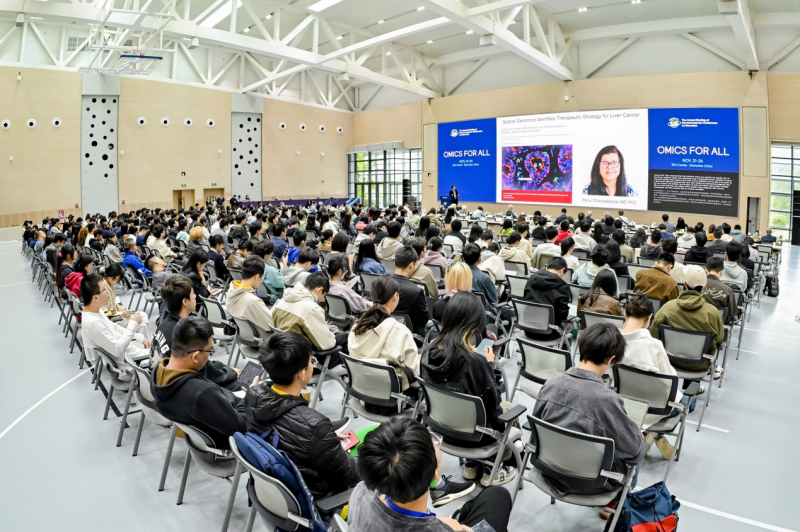 On November 22, the 19th Annual Meeting of the International Conference on Genomics (ICG-19) officially commenced at BGI Group’s Global Headquarters in Shenzhen, China.
On November 22, the 19th Annual Meeting of the International Conference on Genomics (ICG-19) officially commenced at BGI Group’s Global Headquarters in Shenzhen, China.
“Owned by All, Done by all, Shared by All”
The opening day emphasized the critical importance of harnessing genomics and biotechnology to address some of the most urgent issues facing humanity today. Several distinguished speakers shared their insights during the keynote presentations on the transformative role of genomics in tackling global challenges such as aging, public health, and biodiversity conservation.
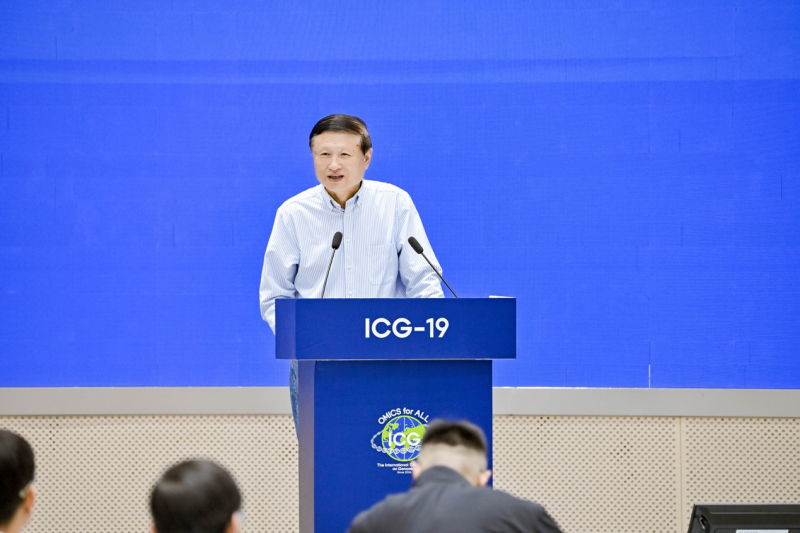 Siqi Liu, Chair of the ICG-19 Academic Committee, Co-founder and Member of the Board of Directors of BGI Group, and Chairman of the Supervisory Board of BGI Group briefly reviewed the history of the ICG in his opening speech.
Siqi Liu, Chair of the ICG-19 Academic Committee, Co-founder and Member of the Board of Directors of BGI Group, and Chairman of the Supervisory Board of BGI Group briefly reviewed the history of the ICG in his opening speech.
The opening ceremony of ICG-19 featured a keynote address by Siqi Liu, Chair of the ICG-19 Academic Committee, Co-founder and Member of the Board of Directors of BGI Group, and Chairman of the Supervisory Board of BGI Group. Dr. Liu briefly reviewed the history of the ICG and highlighted its journey since the inaugural event in Hangzhou in 2006, emphasizing the growth and expanding influence of the ICG over the past 18 years, with events held in cities across China and globally, such as Shenzhen, Wuhan, Qingdao, and Bangkok. He underscored BGI's mission to go beyond research by focusing on advancing the application of genomics in industrial and medical fields, and he expressed hope that this year’s conference will accelerate the integration of genomics technologies into biological and medical applications and foster future innovation in the field.
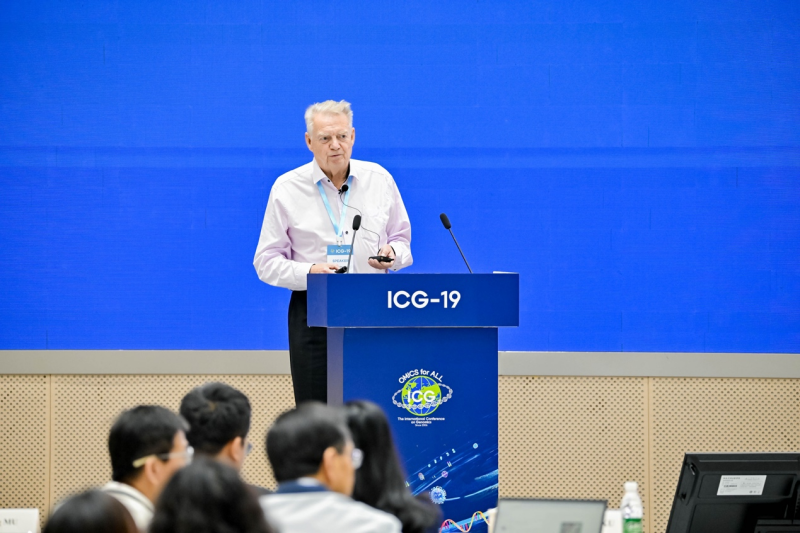 Lars Bolund, Honorary Professor at the Chinese Academy of Sciences and the Chinese Academy of Medical Sciences, as well as the Lars Bolund Institute of Regenerative Medicine, gave a keynote presentation on addressing the issue of aging and discussed current research findings in regenerative medicine.
Lars Bolund, Honorary Professor at the Chinese Academy of Sciences and the Chinese Academy of Medical Sciences, as well as the Lars Bolund Institute of Regenerative Medicine, gave a keynote presentation on addressing the issue of aging and discussed current research findings in regenerative medicine.
Lars Bolund, Honorary Professor at the Chinese Academy of Sciences and the Chinese Academy of Medical Sciences, as well as the Lars Bolund Institute of Regenerative Medicine, focused on addressing the issue of aging and discussed current research findings in regenerative medicine. He emphasized that advancements in massive DNA sequencing, single-cell technology, and spatio-temporal RNA sequencing have enabled AI-based comparative evolutionary studies and provided a deeper understanding of somatic cell evolution. He also highlighted that aging is not strictly a chronological phenomenon. The aging process can be influenced by modifying genetic constitution, lifestyle, and environmental factors through medical interventions such as stem cell therapy or tissue and organ transplantation.
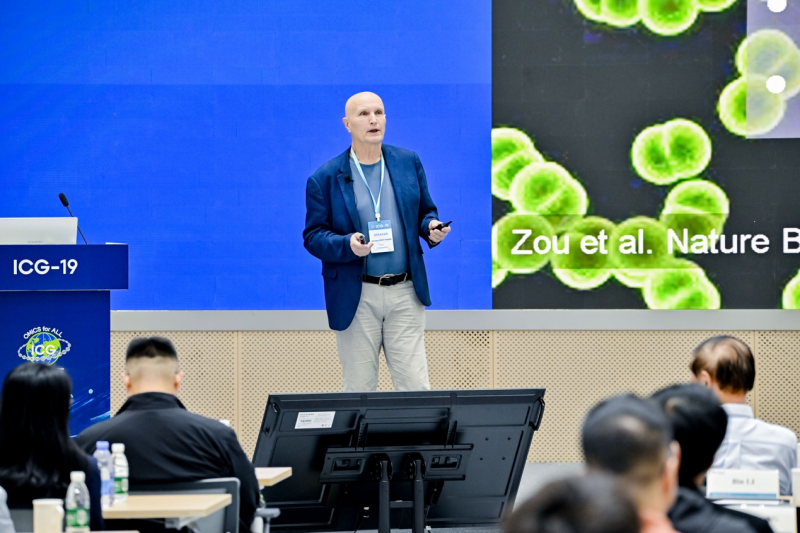 Karsten Kristiansen, Member of the Danish Academy of Natural Sciences and Professor at the University of Copenhagen, emphasized the untapped potential of the oral and gut microbiota for the development of next-generation probiotics.
Karsten Kristiansen, Member of the Danish Academy of Natural Sciences and Professor at the University of Copenhagen, emphasized the untapped potential of the oral and gut microbiota for the development of next-generation probiotics.
Karsten Kristiansen, Member of the Danish Academy of Natural Sciences and Professor at the University of Copenhagen, emphasized the untapped potential of the oral and gut microbiota for the development of next-generation probiotics. His team has embarked on a large-scale project to isolate, cultivate, and characterize bacteria from the human oral cavity and intestine. This effort led to the creation of the "Cultivated Oral Bacteria Genome Reference" (COGR), which includes 1,089 high-quality genomes representing five bacterial phyla and 195 species-level clusters, including 315 genomes of previously unclassified species. Additionally, the "Cultivated Genome Reference" (CGR2) his team developed provides 3,324 high-quality genomes of gut bacteria, identifying 527 species, 179 of which were previously unknown. Professor Kristiansen highlighted the potential of these newly characterized bacteria in combating metabolic disorders, making them promising candidates for next-generation probiotic therapies.
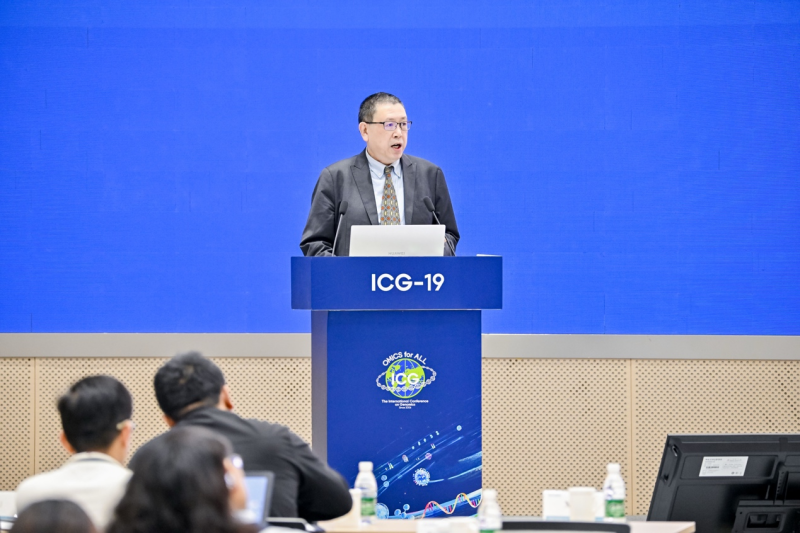 Jun Ma, Academician of the Chinese Academy of Sciences, Professor and Executive Vice-President of Sun Yat-sen University Cancer Center introduced the latest advancements in establishing clinical staging standards for NPC and developing innovative treatment strategies.
Jun Ma, Academician of the Chinese Academy of Sciences, Professor and Executive Vice-President of Sun Yat-sen University Cancer Center introduced the latest advancements in establishing clinical staging standards for NPC and developing innovative treatment strategies.
Jun Ma, Academician of the Chinese Academy of Sciences, Professor and Executive Vice-President of Sun Yat-sen University Cancer Center, emphasized the significant challenges posed by nasopharyngeal carcinoma (NPC), including inadequate early detection rates, poor survival outcomes for advanced-stage patients, and compromised post-treatment quality of life. He introduced the latest advancements in establishing clinical staging standards for NPC and developing innovative treatment strategies that enhance efficacy while minimizing toxicity. In addition, he and his team developed the “Chemotherapy in Combination with Radiotherapy for Definitive-Intent Treatment of Stage II-IVA Nasopharyngeal Carcinoma: CSCO and ASCO Guideline” as part of their efforts to actively explore novel treatment approaches.
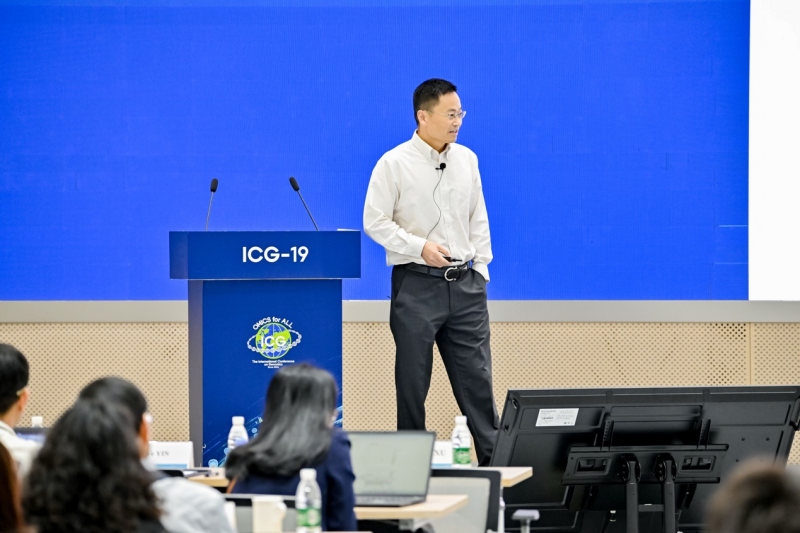 Jiankang Zhu, a Member of the US National Academy of Sciences and a professor at the Southern University of Science and Technology, explained how DNA methylation and CRISPR-based tools can play important roles in disease management and aging interventions.
Jiankang Zhu, a Member of the US National Academy of Sciences and a professor at the Southern University of Science and Technology, explained how DNA methylation and CRISPR-based tools can play important roles in disease management and aging interventions.
Jiankang Zhu, Member of the US National Academy of Sciences and Professor at the Southern University of Science and Technology, highlighted advancements in genetics and epigenetics, emphasizing their roles in healthcare, aging, and agriculture. He also explained how DNA methylation and CRISPR-based tools can play important roles in disease management and aging interventions. In agriculture, genetically edited crops such as high-oleic soybeans, low-GI rice, and nutrient-rich tomatoes showcase innovations aimed at improving health and sustainability. These functional foods offer benefits such as cholesterol reduction, improved sleep, and enhanced nutrition. By combining cutting-edge technology with practical applications, these innovations aim to address critical global challenges in health and nutrition while promoting sustainable development.
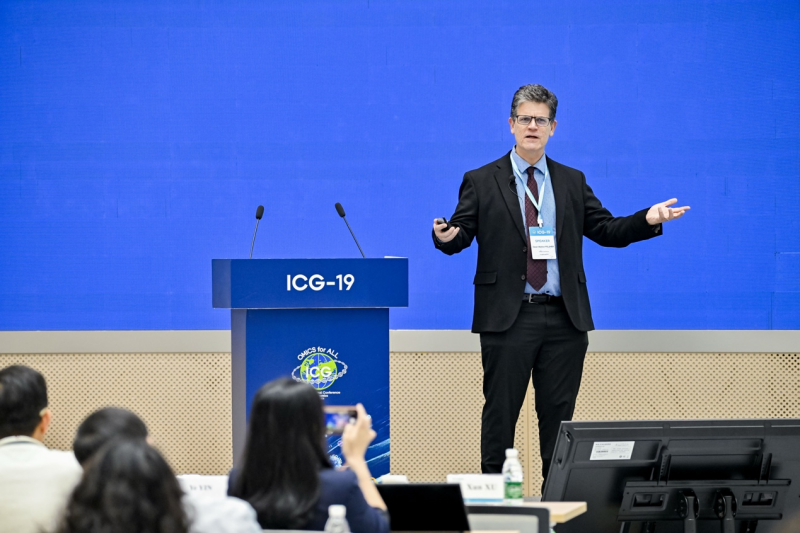 Dean Walton Felsher, Professor and Director at Stanford University, outlined the potential of targeting the MYC oncogene for cancer treatment.
Dean Walton Felsher, Professor and Director at Stanford University, outlined the potential of targeting the MYC oncogene for cancer treatment.
Dean Walton Felsher, Professor and Director at Stanford University, outlined the potential of targeting the MYC oncogene for cancer treatment. He explained that cancer is often driven by genomic changes that activate oncogenes or deactivate tumor suppressor genes. A phenomenon known as "oncogene addiction" occurs when inactivating even a single oncogene can reverse cancer. MYC, one of the most commonly activated oncogenes in human cancers, has been identified as a promising therapeutic target. Inactivation of MYC in various cancers - including lymphoma, leukemia, osteosarcoma, and pancreatic carcinoma - has resulted in significant tumor regression through mechanisms such as proliferative arrest, apoptosis, and immune system involvement. Professor Felsher emphasized that targeting MYC may provide a broadly effective strategy for treating multiple cancer types.
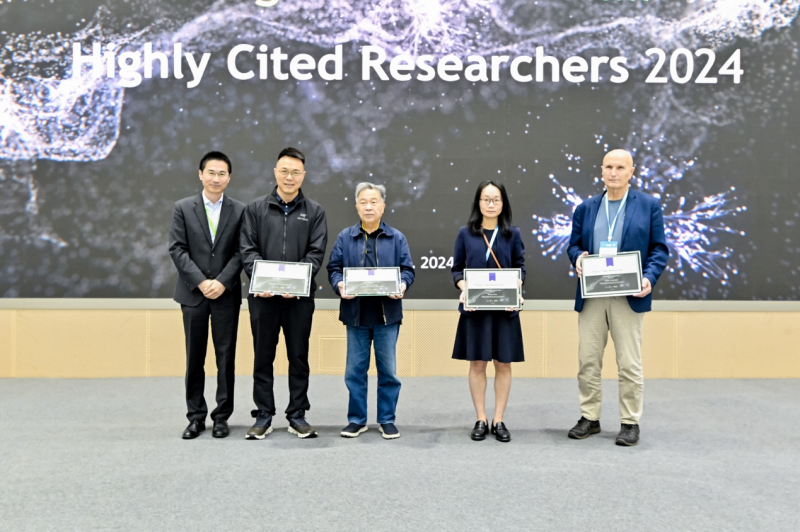 (From right to left) Clarivate honored Karsten Kristiansen, Jinmiao Chen, Huanming Yang, and Xun Xu for their outstanding contributions to their respective research fields, as recognized in the 2024 "Highly Cited Researchers" list.
(From right to left) Clarivate honored Karsten Kristiansen, Jinmiao Chen, Huanming Yang, and Xun Xu for their outstanding contributions to their respective research fields, as recognized in the 2024 "Highly Cited Researchers" list.
During the conference, the global data analytics company Clarivate honored several distinguished individuals named in the 2024 "Highly Cited Researchers" list. The honorees included Huanming Yang, Academician of the Chinese Academy of Sciences, Co-founder and Member of the Board of Directors of BGI Group; Xun Xu, Executive Director of BGI Group and Director of BGI-Research; Karsten Kristiansen, Member of the Danish Academy of Natural Sciences and Professor at the University of Copenhagen; and Jinmiao Chen, Associate Professor at Duke-NUS Medical School. These awards celebrate their outstanding contributions to their respective research fields.
“Standing on the Shoulders of Giants to See the Future”
The attendees took the day to reflect on the achievements in life sciences through global efforts. On November 21, a series of presentations was delivered under the theme, "Standing on the Shoulders of Giants to See the Future."
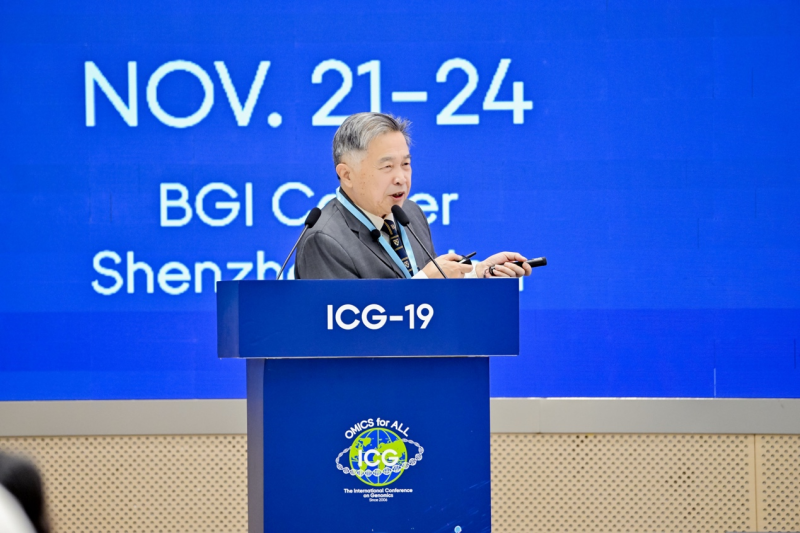 Huanming Yang, Chair of the ICG-19 Organizing Committee, Academician of the Chinese Academy of Sciences, Co-founder and Member of the Board of Directors of BGI Group, and Director-General of BGI, reflected on key milestones in genomics in his keynote speech.
Huanming Yang, Chair of the ICG-19 Organizing Committee, Academician of the Chinese Academy of Sciences, Co-founder and Member of the Board of Directors of BGI Group, and Director-General of BGI, reflected on key milestones in genomics in his keynote speech.
Huanming Yang, Chair of the ICG-19 Organizing Committee, Academician of the Chinese Academy of Sciences, Co-founder and Member of the Board of Directors of BGI Group, and Director-General of BGI, reflected on key milestones in genomics, including the Human Genome Project (HGP), emphasizing ethical considerations, open data access, and global collaboration. His speech explored transformative technologies such as single-cell transcriptomics and AI-driven sequencing, highlighting their applications in life sciences. Through personal anecdotes, philosophical insights, and tributes to scientific pioneers, he enriched the discussion, fostering a vision of innovation, mentorship, and interdisciplinary progress.
Attendees revisited a recorded video speech by James D. Watson, Co-discoverer of the DNA double helix structure and Nobel laureate, delivered in honor of the 70th anniversary of this groundbreaking discovery. Reflecting on his collaboration with Francis Crick, Professor Watson recounted the moment they realized the A-T and G-C base pairs could form the structure of DNA, describing it as seizing "the essence of life." He also praised Professor Huanming Yang for his contributions to genomic research in China. Watson concluded by encouraging young scientists to think ambitiously and strive for success in their careers.
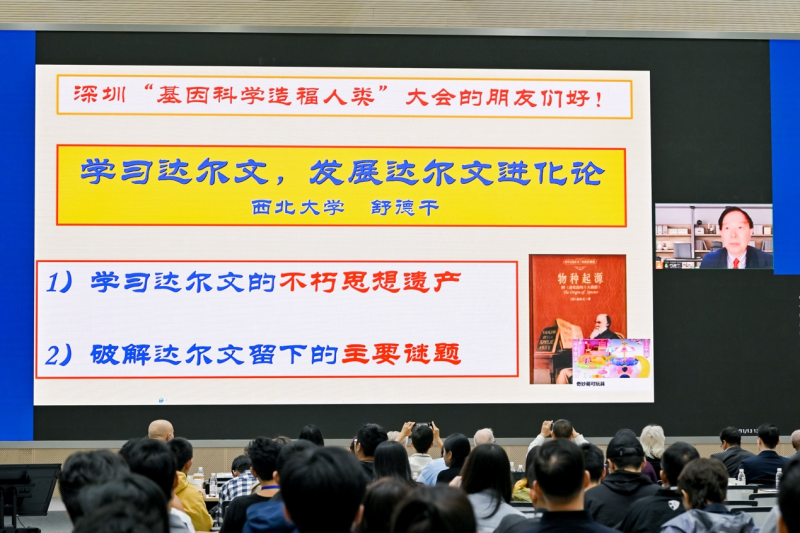 Degan Shu, Academician of the Chinese Academy of Sciences and Professor at Northwest University elaborated on his understanding of Darwinian evolution and discussed his experiences in unraveling mysteries.
Degan Shu, Academician of the Chinese Academy of Sciences and Professor at Northwest University elaborated on his understanding of Darwinian evolution and discussed his experiences in unraveling mysteries.
Degan Shu, Academician of the Chinese Academy of Sciences and Professor at Northwest University, shared profound insights into Darwinian evolution by recounting five key intersections between his nearly 60 years of research and Darwin’s theory of evolution. Through these reflections, he elaborated on his understanding of Darwinian evolution and discussed his experiences in unraveling mysteries such as the "Cambrian Explosion of Life." Professor Shu emphasized that Darwin himself stood on the shoulders of giants like Comte de Buffon and Jean-Baptiste Lamarck, inheriting and developing their ideas. Similarly, Professor Shu encouraged the scientific community to strive to stand on the shoulders of giants, as it is only through this collective intellectual legacy that groundbreaking discoveries can be achieved and human understanding advanced.
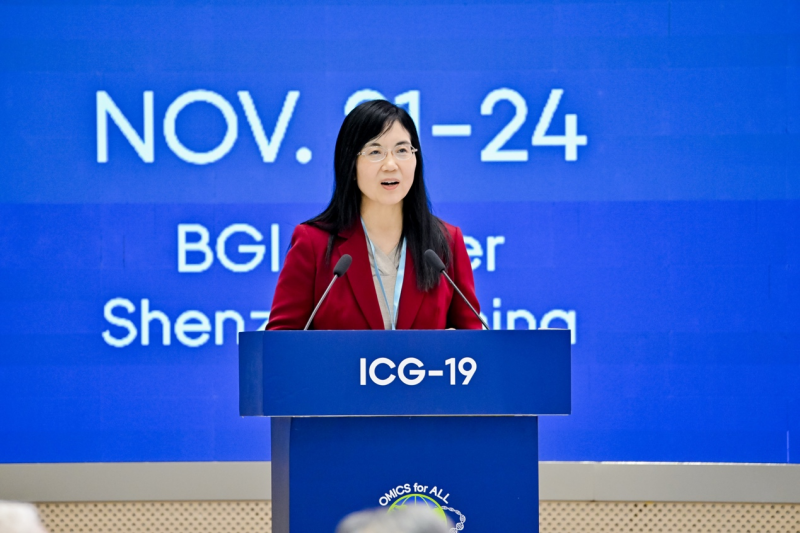 Jun Yu, Professor and Director of the State Key Laboratory at The Chinese University of Hong Kong, as well as a Member of Academia Europaea and the Hong Kong Academy of Sciences, introduced insightful findings on the function, mechanisms, and clinical translation of gut microbiota in cancers.
Jun Yu, Professor and Director of the State Key Laboratory at The Chinese University of Hong Kong, as well as a Member of Academia Europaea and the Hong Kong Academy of Sciences, introduced insightful findings on the function, mechanisms, and clinical translation of gut microbiota in cancers.
Jun Yu, Professor and Director of the State Key Laboratory at The Chinese University of Hong Kong, as well as a Member of Academia Europaea and the Hong Kong Academy of Sciences, introduced insightful findings on the function, mechanisms, and clinical translation of gut microbiota in cancers. Professor Yu’s studies identify gut microbes linked to colorectal cancer (CRC), such as P. anaerobius, A. rambellii, and P. stomatis, which promote cancer via oncogenic pathways. CRC-depleted bacteria, such as S. thermophilus and L. gallinarum, exhibit anti-cancer properties. Fecal microbes, including F. nucleatum, serve as non-invasive CRC biomarkers. In immunotherapy, R. intestinalis and L. gallinarum enhance the efficacy of anti-PD-1 treatments. In gastric cancer, S. anginosus drives inflammation and tumorigenesis following H. pylori eradication.
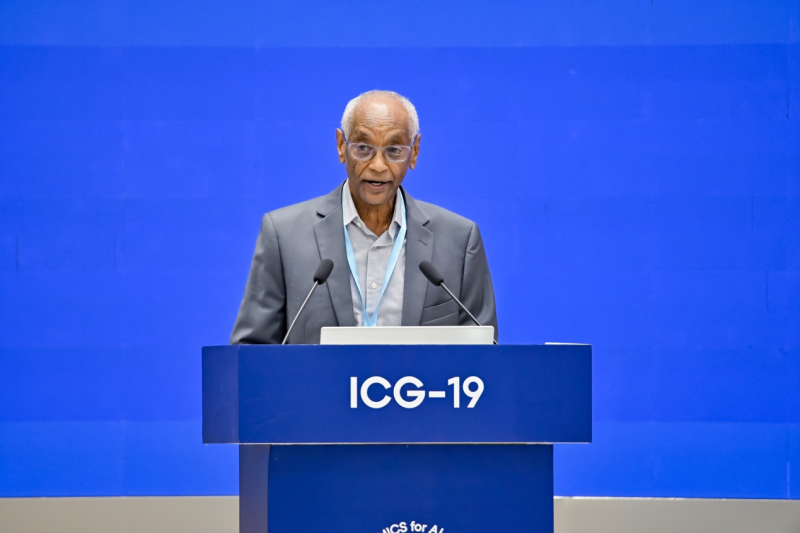 Mohamed Hassan, President of the Sudanese National Academy of Sciences (SNAS), highlighted the vital role of international collaboration in addressing global challenges and driving innovation.
Mohamed Hassan, President of the Sudanese National Academy of Sciences (SNAS), highlighted the vital role of international collaboration in addressing global challenges and driving innovation.
Mohamed Hassan, President of the Sudanese National Academy of Sciences (SNAS), highlighted the vital role of international collaboration in addressing global challenges such as climate change, pandemics, food security, and social inequalities. He emphasized that global partnerships drive innovation by facilitating the sharing of data, tools, and expertise, as demonstrated during the COVID-19 pandemic, where international scientific efforts accelerated vaccine development and treatment breakthroughs. Professor Hassan also stressed the importance of bridging educational disparities through collaborations between developed and developing nations and leveraging online platforms to expand access to knowledge. Strengthening these partnerships is essential for building a more inclusive and sustainable future for all.
ICG-19 Will Continue
The 19th International Conference on Genomics (ICG-19) will continue through November 24, 2024, featuring a comprehensive program of talks on topics such as biodiversity, metagenomics and chronic diseases, frontiers in life sciences and bioinformatics, public health, population genetics and precision medicine, gene editing and biomanufacturing, and science for youth.



